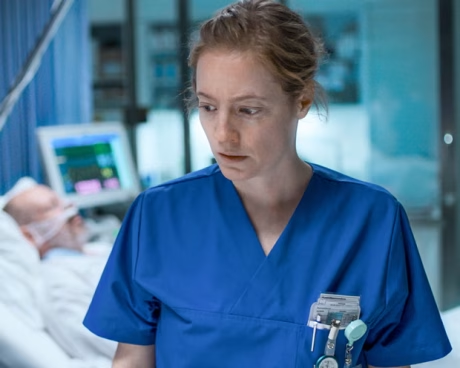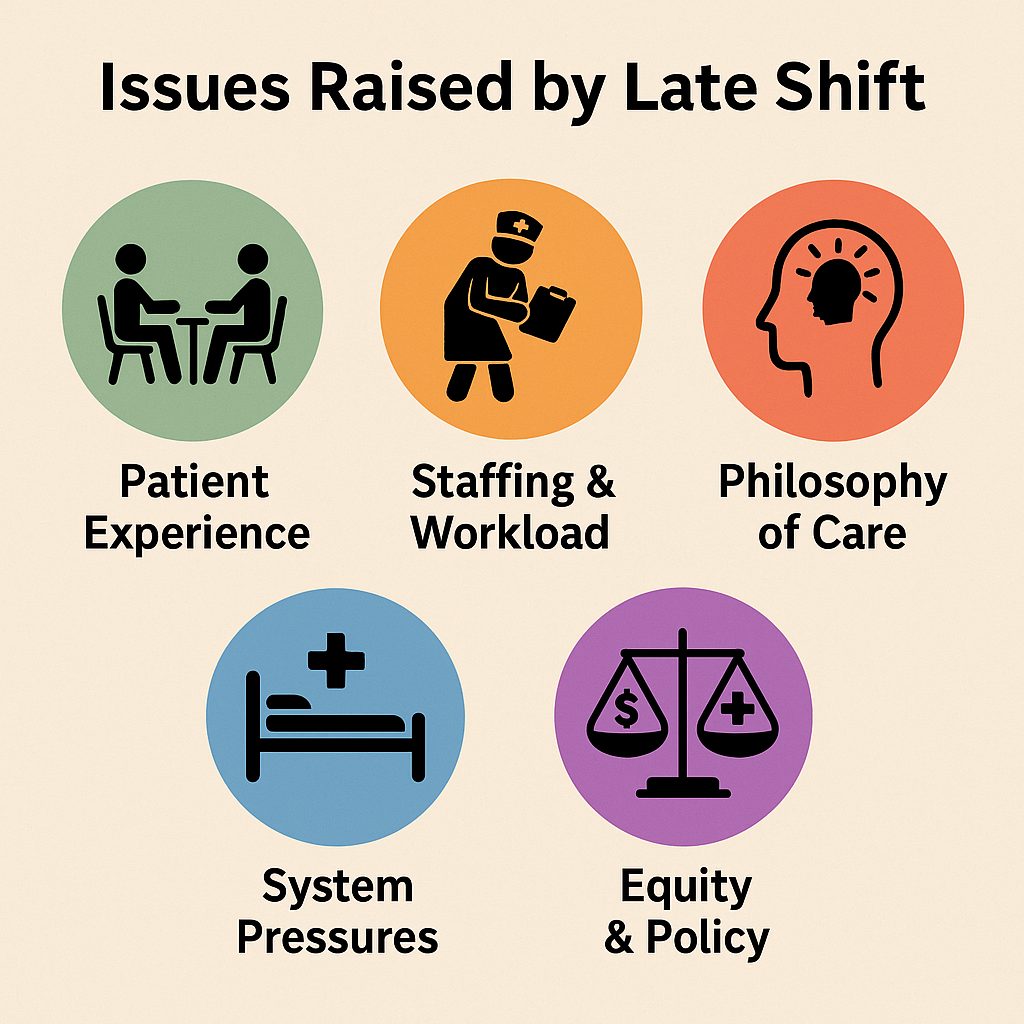
Leonie Benesch
Last week I saw Late Shift (Heldin in German, literally “Heroine”) at the wonderful Alnwick Playhouse. Sitting in the dark among strangers in this rural Northumbrian town, I felt part of a collective witness. When the lights came up, it was as though we had all just stared directly at life and death.
Directed by Andreas Dresen, this immersive film drops you into the night-time wards of an overstretched Swiss hospital. The heroine, Floria, a young divorced nurse juggling childcare, loneliness, and impossible demands, works the “late shift” surrounded by people in extreme pain and distress. What could have been unrelentingly bleak is instead strangely uplifting, showing how human connection can survive, even flourish, within the most pressured of environments . Floria is so stressed that she makes a couple of very bad errors (one medical and one psychological) which threatens to end her career. But the narrative tension is not just generated by these plot devices, but rather is generated by some incredibly realistic acting and mis-en-scene. You absolutely believe that what you are seeing is real. The film is never voyeuristic though; everyone has their dignity.
Here are five things I learnt:
1. Human connection is everything
Paradoxically, it is the wealthy man in his private room who is most isolated, cut off from others, while patients in the crowded ward—who initially resent each other—end up helping and comforting one another. Late Shift shows vividly that companionship, however fragile, makes suffering bearable .
2. Many nurses carry an impossible load
Floria is overstretched, rushed, still trying to be human. That is not melodrama, it is policy reality.
It all made me think about our hospitals. The film is set in a better funded system than ours, but still the lack of resources and staffing is a big issue. FYI: the UK has one of the lowest hospital bed stocks in the rich world, with about 2.4 beds per 1,000 people compared with an OECD-EU average of 4.6 and Germany’s 7.8 (Kings Fund 2021). Pressure therefore concentrates at the bedside.
A&E performance shows the strain: only around 72% of patients in England were seen within four hours in 2023–24, far below the 95% standard, with roughly one in ten waiting over twelve hours in April 2024 (King’s Fund 2024).
Workforce gaps compound this crisis. NHS England recorded more than 112,000 vacancies in March 2023. Although some nursing shortages have eased since the pandemic peak, retention problems and rising demand remain critical (NHS England 2023; Nuffield Trust 2023).
This is not just a British issue. Switzerland has also faced severe nursing shortages, with estimates of around 15,000 vacant posts in recent years and warnings of tens of thousands more nurses needed by 2030, prompting voters to back a national “nursing initiative”.
Research consistently links staffing levels to outcomes and to nurses’ wellbeing, with high workloads associated with burnout, dissatisfaction, and increased patient mortality. Effective training can help an individual nurse endure a shift, but safe staffing levels require political will and systemic investment (Aiken et al. 2014).
3. Mindfulness is a lifeline, not a luxury
The film shows nurses who do more than deliver drugs. They supply presence, motivation, and dignity. In a world which can be so stressful, moments of calm attention are as therapeutic as any prescription, for patients and for staff. Late Shift honours that quiet skill (The Guardian 2025).
4. Dying is natural, hospitals are not
Fluorescent light, clipped voices, plastic curtains, the strange neutrality of waiting rooms. Watching, I thought of Philip Larkin’s poem The Building and its truth:
“All know they are going to die,
Not yet, perhaps not here, but in the end,
And somewhere like this.” (Larkin 1979)
The film insists that death can be managed well, or badly. The difference is often staffing, time, and the human voice at the bedside (The Guardian 2025).
5. Collective witnessing matters
Seeing the film in Northumberland, surrounded by people I didn’t know, I felt we were bound together by a quiet recognition: this is how we live, and this is how we die. For all its troubling subject matter, the film is curiously uplifting because it refuses denial.
In the end, Late Shift is both realistic and mythic, like a modern Dante’s Inferno. Through Floria’s night of care, it shows us that compassion is possible even in the most overburdened of systems, and that life’s final passage, though often difficult, can still be accompanied by dignity and love.
The public–private question the film forces us to ask
Late Shift is set in Switzerland, a country with universal coverage delivered through mandatory private insurance provided by regulated insurers, with significant deductibles and top-ups. It works well in many respects, yet still faces workforce shortages and equity debates, including the need for national action on nursing (Commonwealth Fund 2020; World Health Systems Facts 2023).
By contrast, the UK guarantees comprehensive care through the NHS, free at the point of use, but the service is under acute pressure. Public satisfaction fell to historic lows in 2024, with only around one in five people satisfied (Nuffield Trust 2024).
Use of private routes is rising: almost one in eight Britons now has private medical insurance, the highest in nearly two decades, largely via employers. The NHS itself buys more planned care from private hospitals than before the pandemic—about 7.5% of admissions in 2022–23 (The Guardian 2025a; LowDownNHS 2023).
The UK still spends a moderate share of GDP on health compared with peers, with most funding pooled publicly, which protects people from catastrophic costs. Yet crumbling infrastructure, staff shortages, and backlogs are eroding the social contract (King’s Fund 2023; OECD 2025).
So what do we want to support, as a society?
- Safe staffing first. Fund and enforce minimum staffing standards, publish nurse-to-patient ratios, and design hospitals to reduce risks. Evidence shows this saves lives (Aiken et al. 2014).
- Beds, step-down, and flow. Increase core bed stock and intermediate care so A&Es are not jammed by delayed discharges. Germany’s higher bed base is a reminder that resilience costs money (Kings Fund 2021).
- Retention and training. Make the NHS Long Term Workforce Plan real with funded training, placements, and career ladders, and follow Switzerland’s example by investing in homegrown staff (NHS England 2023).
- Clear rules for NHS–independent sector use. Publish transparent value tests and safeguards so outsourcing does not hollow out the workforce (Nuffield Trust 2023).
- Palliative and end-of-life care as core. Commission ward-based palliative input seven days a week so dying patients are not left alone with pain or fear. The film shows how much this matters (The Guardian 2025).
Late Shift is curiously uplifting because it refuses denial. It shows the cost of running hospitals, and illustrates the simple truth that connection, time, and attention are not frills but should be at the heart of an effective health care system. The question is whether we will fund healthcare so that Floria, and her real-world colleagues, can keep doing it—and whether we want a system where dignity at 3 a.m. is a public right, not a private upgrade.
References
Aiken, L.H., Sloane, D.M., Bruyneel, L., Van den Heede, K., Griffiths, P., Busse, R., … & Sermeus, W. (2014) ‘Nurse staffing and education and hospital mortality in nine European countries: a retrospective observational study’, The Lancet, 383(9931), pp. 1824–1830. Available at: https://doi.org/10.1016/S0140-6736(13)62631-8
Commonwealth Fund (2020) International Health Care System Profiles: Switzerland. Available at: https://www.commonwealthfund.org/international-health-policy-center/countries/switzerland
Kings Fund(2021) Hospital bed numbers in the UK. Available at: https://www.kingsfund.org.uk/publications/nhs-hospital-bed-numbers
King’s Fund (2023) NHS in numbers. Available at: https://www.kingsfund.org.uk/publications/nhs-in-numbers
King’s Fund (2024) Urgent and Emergency Care: Four-Hour Target. Available at: https://www.kingsfund.org.uk/publications/urgent-and-emergency-care
Larkin, P. (1979) The Building, in High Windows. London: Faber & Faber.
LowDownNHS (2023) Private sector and the NHS. Available at: https://lowdownnhs.info
NHS England (2023) NHS Workforce Statistics, March 2023. Available at: https://www.england.nhs.uk/statistics
Nuffield Trust (2023) The NHS Workforce in Numbers. Available at: https://www.nuffieldtrust.org.uk/resource/the-nhs-workforce-in-numbers
Nuffield Trust (2024) Public satisfaction with the NHS. Available at: https://www.nuffieldtrust.org.uk/public-satisfaction-nhs
OECD (2025) Health at a Glance 2023. Available at: https://www.oecd.org/health/health-at-a-glance
The Guardian (2025a) ‘ Almost one in eight Britons now has private medical insurance, say healthcare analysts’. Available at: https://www.theguardian.com/society/2025/jan/30/almost-one-in-eight-britons-now-has-private-medical-insurance-say-healthcare-analysts
The Guardian (2025) ‘Late Shift review: pressure is on in badly understaffed hospital as compassion shines through’. Available at: https://www.theguardian.com/film/2025/jul/29/late-shift-review-pressure-is-on-in-badly-understaffed-hospital-as-compassion-shines-through
Wikipedia (2025) Late Shift (film). Available at: https://en.wikipedia.org/wiki/Late_Shift_(film)
World Health Systems Facts (2023) Switzerland: Health System Overview. Available at: https://www.worldhealthsystemsfacts.org/switzerland


Leave a Reply